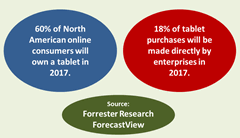Although BYOD is certainly not just about devices, the market evolutions regarding tablets and smartphones are interesting, also from a BYOD viewpoint. In a global tablet forecast, Forrester looks at some BYOD implications of rising tablet sales and adoption.
Analyst JP Gownder states that tablets have hit hyper-growth and become mainstay devices as the third form factor carried by most online consumers in developed markets first.

Some data:
- Forrester expects global sales of tablets to reach 381 million units by 2017 and thus a worldwide installed base of 905 million. To put those numbers in perspective: this equals over one in eight people on earth and that includes 29% of online consumers across the globe. From a BYOD and business perspective, it’s interesting to note that enterprise purchases of tablets will make up 18% of sales by 2017.
- When analyzing different regions, Forrester predicts that by 2017 60% of online consumers in North America will own a tablet. In Europe, 42% of consumers will have one and other regions that will lead and even see tablets reaching majority status include Asian markets such as Singapore and South Korea.
BYOD: tablets playing an increasingly critical role at work
As mentioned, Forrester also looked at the use of tablets at work and the BYOD perspective. According to the research firm, both company-issued and bring-your-own tablets will be omnipresent in workplaces in developed and some dynamic/developing regions such as urban China.
Forrester sees an increase of scenarios whereby employees will partially or even fully pay for the cost of the tablet. This would mainly be because this way employees can get the device, in this case tablet, of their choice. This model, Gownder writes, will increasingly appear in addition of company-issued models and pure BYOD models whereby employees bring their own devices.
A broader variety of models and approaches to embrace the BYOD phenomenon and consumerization in general appears as we see in the different attitudes businesses have in this regard. In the end, it’s just like with BYOD policies: every business is different and so are the benefits of tablets and BYOD programs, depending on the context of usage, profile and more.
Gownder and his Forrester colleague also predict the emergence of vertical scenarios, giving an example in healthcare, and a move towards issuing tablets to execs and other usual suspects such as salespeople to other roles in coming years.
Finally, new technologies will give the tablet a role in collaboration, opening up new opportunities for businesses.

